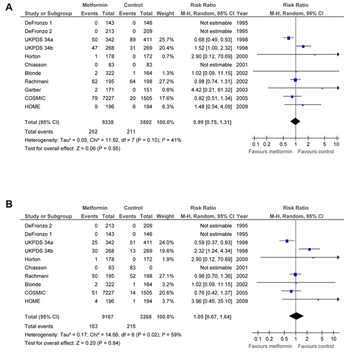Metformin: Difference between revisions
imported>Robert Badgett |
imported>Robert Badgett No edit summary |
||
| Line 1: | Line 1: | ||
{{subpages}} | {{subpages}} | ||
'''Metformin''' is an oral drug used in the treatment of [[diabetes]]. Chemically, it is of the [[biguanide]] class. Clinically, it has the rare property, among diabetes treatments, of not causing weight gain or even inducing weight loss. | '''Metformin''' is an oral drug used in the treatment of [[diabetes mellitus type 2]]. Chemically, it is of the [[biguanide]] class. Clinically, it has the rare property, among diabetes treatments, of not causing weight gain or even inducing weight loss. | ||
It is approved as monotherapy as an adjunct to diet and exercise, in combination with a [[sulfonylurea]] or a [[thiazolidinedione]], and with a [[repaglinide]] or [[nateglinide]]. Metformin may also be supplemented with insulin. | It is approved as monotherapy as an adjunct to diet and exercise, in combination with a [[sulfonylurea]] or a [[thiazolidinedione]], and with a [[repaglinide]] or [[nateglinide]]. Metformin may also be supplemented with insulin. | ||
| Line 6: | Line 6: | ||
==Mechanism of action== | ==Mechanism of action== | ||
While the mechanism is not known with certainty, it appears to increase peripheral and hepatic sensitivity to insulin, decreasing hepatic glucose production and increasing insulin-stimulated uptake and utilization of glucose by muscle and fat cells. | While the mechanism is not known with certainty, it appears to increase peripheral and hepatic sensitivity to insulin, decreasing hepatic glucose production and increasing insulin-stimulated uptake and utilization of glucose by muscle and fat cells. | ||
==Effectiveness== | |||
The effectiveness of metoforming in preventing complications from diabetes is uncertain. | |||
{{Image|Journal.pmed.1001204 g002.png|right|350px|Forest plot of the effectiveness of metformin.}} | |||
==Adverse effects== | ==Adverse effects== | ||
Revision as of 07:41, 12 April 2012
Metformin is an oral drug used in the treatment of diabetes mellitus type 2. Chemically, it is of the biguanide class. Clinically, it has the rare property, among diabetes treatments, of not causing weight gain or even inducing weight loss.
It is approved as monotherapy as an adjunct to diet and exercise, in combination with a sulfonylurea or a thiazolidinedione, and with a repaglinide or nateglinide. Metformin may also be supplemented with insulin.
Mechanism of action
While the mechanism is not known with certainty, it appears to increase peripheral and hepatic sensitivity to insulin, decreasing hepatic glucose production and increasing insulin-stimulated uptake and utilization of glucose by muscle and fat cells.
Effectiveness
The effectiveness of metoforming in preventing complications from diabetes is uncertain.
Adverse effects
Gastrointestinal side effects are fairly common and do lead to discontinuation in a number of patients.
Lactic acidosis is possibly increased.[1]
Metformin can also exhibit renal toxicity; it may increase the risk of cardiovascular events, although this needs to be traded against the cardiovascular risks of uncontrolled glucose.
Metformin may cause vitamin B 12 deficiency.[2][3]
References
- ↑ Salpeter SR, Greyber E, Pasternak GA, Salpeter Posthumous EE (2010). "Risk of fatal and nonfatal lactic acidosis with metformin use in type 2 diabetes mellitus.". Cochrane Database Syst Rev (1): CD002967. DOI:10.1002/14651858.CD002967.pub3. PMID 20091535. Research Blogging.
- ↑ Wile DJ, Toth C (2010). "Association of metformin, elevated homocysteine, and methylmalonic acid levels and clinically worsened diabetic peripheral neuropathy.". Diabetes Care 33 (1): 156-61. DOI:10.2337/dc09-0606. PMID 19846797. PMC PMC2797962. Research Blogging.
- ↑ de Jager J, Kooy A, Lehert P, Wulffelé MG, van der Kolk J, Bets D et al. (2010). "Long term treatment with metformin in patients with type 2 diabetes and risk of vitamin B-12 deficiency: randomised placebo controlled trial.". BMJ 340: c2181. DOI:10.1136/bmj.c2181. PMID 20488910. Research Blogging.
